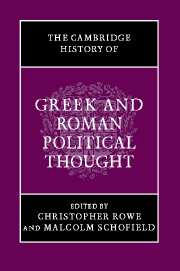Book contents
- Frontmatter
- Introduction
- PART I ARCHAIC AND CLASSICAL GREECE
- 1 Greek political thought: the historical context
- THE BEGINNINGS
- 2 Poets, lawgivers, and the beginnings of political reflection in archaic Greece
- 3 Greek drama and political theory
- 4 Herodotus, Thucydides and the sophists
- 5 Democritus
- 6 The Orators
- 7 Xenophon and Isocrates
- 8 Socrates and Plato: an introduction
- 9 Socrates
- 10 Approaching the Republic
- 11 The Politicus and other dialogues
- 12 The Laws
- 13 Plato and practical politics
- 14 Cleitophon and Minos
- ARISTOTLE
- PART II THE HELLENISTIC AND ROMAN WORLDS
- Epilogue
- Bibliographies
- Index
- Map 1. Greece in the fifth century bc"
- References
7 - Xenophon and Isocrates
from THE BEGINNINGS
Published online by Cambridge University Press: 28 March 2008
- Frontmatter
- Introduction
- PART I ARCHAIC AND CLASSICAL GREECE
- 1 Greek political thought: the historical context
- THE BEGINNINGS
- 2 Poets, lawgivers, and the beginnings of political reflection in archaic Greece
- 3 Greek drama and political theory
- 4 Herodotus, Thucydides and the sophists
- 5 Democritus
- 6 The Orators
- 7 Xenophon and Isocrates
- 8 Socrates and Plato: an introduction
- 9 Socrates
- 10 Approaching the Republic
- 11 The Politicus and other dialogues
- 12 The Laws
- 13 Plato and practical politics
- 14 Cleitophon and Minos
- ARISTOTLE
- PART II THE HELLENISTIC AND ROMAN WORLDS
- Epilogue
- Bibliographies
- Index
- Map 1. Greece in the fifth century bc"
- References
Summary
Xenophon (c.430 to at least 356 bc) and Isocrates (436–338 bc), contemporaries of Plato, had the opportunity to learn from Socrates and other philosophers who aimed to produce political virtue. Isocrates’ own ‘philosophy’ took the form of an ‘education through speaking and writing’ that prepared pupils to play their part in domestic and international politics. His speeches served as models. Xenophon spent his maturity in exile from Athens ‘hunting, writing his works and entertaining his friends’ in Scillus in the Peloponnese. His works also offer a ‘philosophic’ education in political virtue and sound government.
Aristotle believed that the aim of community government was to implement the common good. For him the polis was the supreme community, and its goal the greatest good (Pol. 1252a1–7; cf. 1278b30–1279a21, 1282b14–22). Xenophon and Isocrates addressed the government of other communities as well as the polis. Xenophon’s Cyropaedia sought to explain Cyrus’ successful government of eastern kingdoms (1. 1. 1–6); his Hiero dramatized the reform of tyrannical rule of a polis, while his Oeconomicus 7–21 examined Ischomachus’ successful government of his household; his Constitution of the Spartans (Lacedaimoniōn Politeia) described the excellent laws of the Spartan Lycurgus. These works made a lasting impression on political thought. Xenophon’s models seem undemocratic (a Persian prince, a tyrant, an aristocratic householder, Sparta), and he had no reason to love the Athenian democracy that had procured his exile and executed his teacher Socrates, but the principles that inform his models are consistent and have broad application. Isocrates wrote speeches that also endorse various kinds of government: Areopagiticus (probably 354) persuades the Athenians to restore their ancestral constitution, while Panathenaicus (339) proves their ancestral constitution superior to the Spartan constitution; ad Nicoclem (c.372) shows the prince Nicocles of Cyprus how to rule his subjects, while Nicocles (c.368) shows his subjects how to behave toward their king; Panegyricus (380) and Ad Philippum (346) persuade first the Athenians and then Philip of Macedon to unite and lead the Greeks against Persia.
- Type
- Chapter
- Information
- The Cambridge History of Greek and Roman Political Thought , pp. 142 - 154Publisher: Cambridge University PressPrint publication year: 2000
References
- 4
- Cited by

